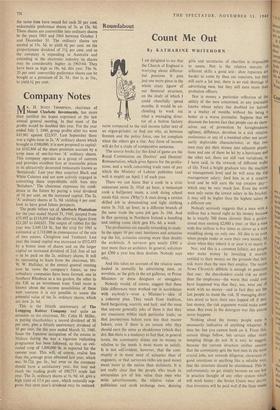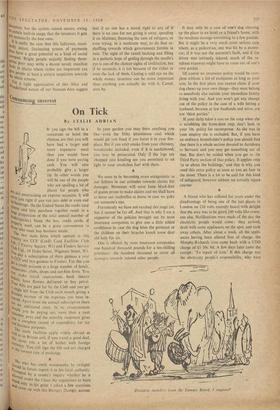Roundabout
Count Me Out
By KATHARINE WHITEHORN The source books for this kind of game are the Royal .Commission on Doctors' and Dentists' Remuneration, which gives figures for the profes- sions; and a work concerning trade rates of pay which the Ministry of Labour publishes (and well it might) on April 1 of each year.
There we can learn that a cook in a civic restaurant earns 2s. 100. an hour, a restaurant cook a halfpenny more, a cook doing school meals 6id. more. (Why?) A man doing a certain skilled job in dressmaking and light clothing earns 3s. 51d. an hour, in a different branch of the same trade the same job gets 3s. 10d. And in flax spinning in Northern Ireland a bundling and reeling room clerk gets 81s. 6d. a week.
The professions are equally rewarding to study. In the upper 10 per cent. barristers and actuaries top the list, actuaries earning more than double the architects. A surveyor gets nearly £300 a year more than an architect. In general, solicitors get £300 a year less than dentists. Nobody says why.
And this takes no account of the relative sums hauled in annually by advertising men, or novelists, or the girls in the art galleries, or Prime Ministers or dress designers or smugglers.
Nobody would, of course, suggest that these little differences were worked out in accordance with anybody's-even a Minister's-idea of a coherent plan. They result from tradition, hard bargaining, scarcity and luck; and the most that anyone generally asks of them is that they are consistent within each particular trade; so that journeymen bakers earn less than master bakers, even if there is no reason why they should earn the same as shoddymen (which they do). But there is a tendency to feel that, in general terms, the community dishes out its money in relation to the needs it most wants to satisfy. It is not self-evident, however, that the com- munity is in more need of actuaries than of engineers, or that surveyors (who are paid more) mean more to the nation than architects. It is not really clear that the people who teach in universities are of less value than men who write advertisements; the relative value of politicians and stock exchange men, dancing
girls and secretaries of charities is impossible to assess. Nor is the relative scarcity of different skills a good test: shoe repairers are harder to come by than car repairers, but they still earn a lot less; there is no real shortage of advertising men, but they still earn more than probation officers.
Nor is money a particular reflection of the ability of the men concerned, as any journalist knows whose salary has doubled (or halved) in a matter of months without his being a
better or a worse journalist. Suppose that we discount the known fact that people can do them- selves out of promotion by farsightedness, ugliness, diffidence, devotion to a sick relative, restlessness or any of a hundred other not neces-
sarily deplorable characteristics; or that two
men may put their money into adjacent planta- tions and one of them be hit by a hurricane and
the other not, there are still vast variations, as I have said, in the rewards of different walks of life. Feed a bright graduate into the machine
at management level and he will earn the top
management salary; feed him in at a creative level and he will earn the top creative payer which may be very much less. Even the worst man only earns the lowest salary in his bracket; it may still be higher than the highest salary in ' a different one.
Nobody seriously suggests that a man with million has a moral right to his money because he is exactly 500 times cleverer than a profes- sional man earning £2,000 a year; or that a man with five million is five times as clever as a man muddling along on only one. All this is so even when people make or earn their own money, let alone when they inherit it or steal it or marry it.
Nor, and this is a common fallacy, are people who make money by investing it, morally entitled to their money on the grounds that they risk more than the men they employ. The recent News Chronicle debacle is enough to puncture that one: the shareholders could risk no more than the employees-the worst that could ever have happened was that they, too, were out of work with no money-and in fact they are the last people to stand the risk. If managing direc- tors stood to have their ears lopped off if they lost money, the risk argument would make some sense. But even in the detergent war this almost never happens.
Nothing about the money people earn is necessarily indicative of anything whatever. It may be; but you cannot bank on it. From this, certain things follow, but certain other more tempting things do not. It is easy to suggest, because the current structure neither ensures that the community gets the best men in the most crucial jobs, nor rewards diligence, cleverness or good intentions in anything like a reliable way'
that the structure should be abandoned. This is. she unfortunately, no go; simply because no one has Pr, in practice thought of any other system which
will work better: the Soviet Union may decree Wa that inventors will be paid well if the State wants iq
a
inventors; but the system cannot ensure, owing to Certain built-in snags, that the inventors it gets are necessarily the best ones. It is oddly the case that this ludicrous, mani- iestl , Y unjust, fascinating system of payments ttoes have a great potential as a kind of social
COrn St.
MY( Bright people unjustly finding them- poor may write a decent novel; manifest foolsin Places where riches are important can „ give the at least a certain scepticism towards whole scheme.
oic't a right appreciation of this Alice and Iderland nature of our finances does suggest that if no one has a moral right to any of it there is no case for not giving it away, spending it on Matisses, financing the care of refugees, or even trying, in a moderate way, to do that re- shuffling towards which governments fumble in vain. The sight of the camel backing and filling in a pathetic hope of getting through the needle's eye is one of the choicer sights of civilisation, but if he succeeds, it is not because of the riches or even the lack of them. Casting a cold eye on the whole money structure can be more important than anything you actually do with it. Camel, pass by. •















































 Previous page
Previous page